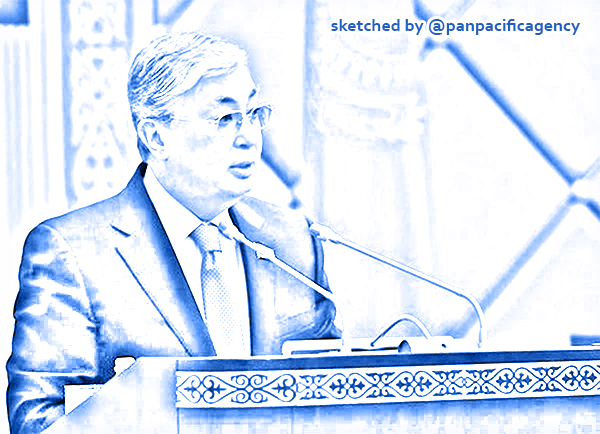[Analytics] The China–Russia condominium in Kazakhstan

Kassym-Jomart Tokayev took over as Head of State following presidential elections in Kazakhstan. Photo: Modern Diplomacy. Sketched by the Pan Pacific Agency.
In early January 2022, Kazakhstan experienced its worst riots in recent history. Many observers argued that the riots could undermine Chinese interests in this resource-rich country. But the situation is far more complex. Loro Horta specially for the East Asia Forum.
Over the past decade, China has emerged as an important economic player in Kazakhstan and Central Asia. By 2016, China’s largest state-owned oil company, Sinopec, along with a few other companies, had invested over US$20 billion in the Kazakh oil and gas fields. In 2019, Chinese investment in Kazakhstan totalled US$27.6 billion.
Two-way trade between China and Kazakhstan surpassed US$15.4 billion in 2020, with China importing primarily oil and gas and Kazakhstan importing textiles, machinery and metals. In 2020, China accounted for over 18 per cent of Kazakhstan’s foreign trade and there were more than 700 joint companies.
Traditionally, the Kazakh elite was educated in the former Soviet Union. While some have pursued studies in the United States and Europe, the number of scholarships provided by China is far greater than those provided by any other country. Several Kazakh ministers and senior security officials have studied in China. President Kassym-Jomart Tokayev is fluent in Chinese and served in China as a diplomat. Beijing has invested significant resources in cultivating the Kazakh elite and this investment has paid off.
China’s main interest in Kazakhstan is access to the country’s vast energy supplies. Oil and gas imports from Kazakhstan and other Central Asian countries, such as Turkmenistan, reduce China’s dependence on the Middle East. Central Asian energy routes also allow China to bypass the Malacca Strait in case of conflict with the United States. Trade and investment have gained China powerful friends among the Kazakh elite and ensured the protection of its interests. But among the Kazakh population, Chinese soft power remains weak. There have been several anti-Chinese riots in Kazakhstan in the past decade. Chinese policies in Xinjiang also contribute to negative views of China. Ethnic Uighurs in Kazakhstan account for 1.5 per cent of the population.
In contrast to China’s economic success, Russia’s economic presence has seen a significant decline, but Russian soft power remains somewhat high. Strong ties between Kazakhstan and Russia date back to the Tsarist monarchy and the Soviet period. Over 20 per cent of Kazakhstan’s population is of Slavic ancestry. According to UNESCO, an estimated 60,000 Kazakhs were studying in Russia in 2019, while 15,000 were studying in China. Russian language and cultural influence remains high. Russian TV stations are far more popular than local stations.
Yet there are anti-Russian sentiments among the Kazakh population. Some fear that Russia may annex territories in Northern Kazakhstan, where the majority of the population is of Slavic origin.
Knowing the limits of its influence in Kazakhstan and Central Asia, Beijing has focused on the economic front and energy resources, deferring to Moscow on security and political matters. Beijing has been careful not to upset Russia as an important ally. Moscow has in turn allowed China to claim a greater share of Kazakh energy resources.
Central Asian leaders believe that Russia would only intervene militarily to defend their regimes in case of internal turmoil. Russian troops deployed to Tajikistan in the 1990s during Tajikistan’s civil war and in 2010 Kyrgyzstan requested Russian military assistance to deal with internal instability. China, on the other hand, has limited itself to providing diplomatic and financial support.
Following the January 2022 riots in Kazakhstan, the Kazakh government requested Russian assistance to quell the disturbance. But, by the time Russian troops were deployed, the Kazakh government already had the situation largely under control. The presence of Russian troops served more as a powerful deterrence to internal opponents, rather than an operational necessity. Over 2000 troops were deployed under the Collective Security Treaty Organization, a Russia-led military alliance. The troop deployment demonstrated to internal opponents that the government has powerful allies around its borders.
Kazakhstan’s increasing dependence on China and Russia may further erode US influence in the country and impact its billion-dollar investments in the energy sector. But Kazakhstan will continue to court US, European and Japanese investment as a way to mitigate its excessive dependence on China and Russia. Kazakh leaders have often tolerated Western criticism over human rights to preserve lucrative economic ties. Kazakhstan is likely to continue this policy but with much less room to manoeuvre.
Some Western observers believe that the January riots may undermine Chinese influence in Kazakhstan. But it may have the opposite effect. The rapid deployment of Russian troops further demonstrated to Kazakh leaders that Russia is the ultimate guarantor of their security. During the crisis, China limited itself to statements of solidarity and offers of economic assistance. Central Asian leaders know that they need the assistance of both powers. Under the China–Russia condominium, Kazakh President Kassym-Jomart Tokayev and other Central Asian leaders seem to be secure in power.
Loro Horta is a public servant based in Dili and is a former Timor-Leste ambassador to Cuba.